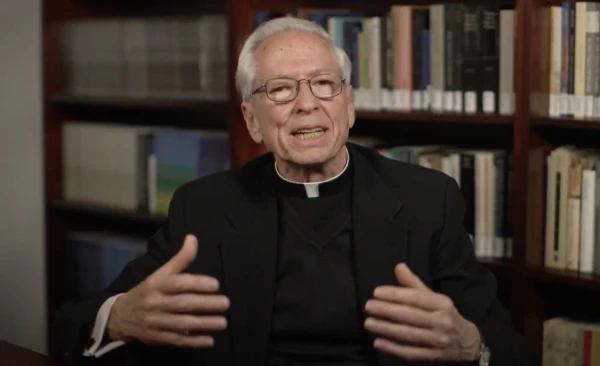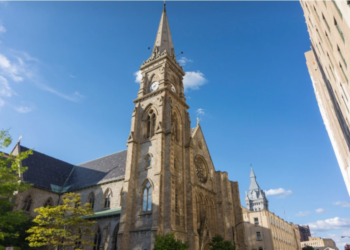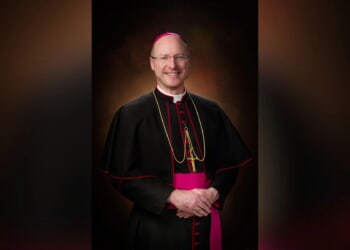Washington, D.C. Newsroom, Apr 8, 2025 /
12:40 pm
Twenty Catholic and evangelical Protestant scholars have issued a joint statement on where both traditions are unified and where they are distinct in their understandings of the four marks of the Church: one, holy, catholic, and apostolic.
The Nicene Creed was initially adopted at the First Council of Nicaea in A.D. 325, but the referenced “four marks” were added to the creed at the second ecumenical council less than four decades later, in A.D. 381.
Although some interpretations of the councils are debated among Christian faith communities, the Catholic Church, Eastern and Oriental Orthodox Churches, and most traditional Protestant communities all recognize the validity and authority of these councils and profess a vernacular translation of the creed.
Scholars associated with the Evangelicals and Catholics Together project have now released a seven-page statement on the four marks titled “The Pillar and Foundation of Truth.”
“Our differences notwithstanding, we acknowledge the truth of the Gospel: Christ is one,” the document reads. “He is holy, and he is the Lord of all. Christ is the source and guarantor of apostolic teaching. Therefore, every gathering of faithful Christians possesses to some degree the four notes of the church, however imperfectly.”
R.R. Reno, the executive director of First Things magazine and one of the leaders and signatories of the initiative, told CNA the statement was issued “so that we can be better instructed to what our traditions teach about the Church.”
He said Evangelicals and Catholics Together, which was first launched in the 1990s, helps “to promote the larger goal of Christian unity by speaking about the areas where we agree” but also avoids a “false ecumenism that pretends that there are not profound differences.”
Catholic signatories include the group’s Catholic theological co-chair, Seton Hall University theology professor emeritus Monsignor Thomas Guarino, Ethics and Public Policy Center fellow George Weigel, and The Catholic University of America theology professor Christopher Ruddy.
Evangelical signatories include Gerald McDermott, an Anglican theologian and instructor at Jerusalem Seminary and Reformed Episcopal Seminary; Laura Smit, a professor at Calvin University; and Dale Coulter, an ordained minister in the Church of God and theology professor at Pentecostal Theological Seminary.
One, holy, catholic, and apostolic
The statement notes that the scholars “do not propose to resolve the questions that have divided Protestants and Catholics for centuries,” but “rather, we seek to express a shared understanding of the creedal marks of the Church.”
“Contemporary secular culture attacks and damages our corporate witness to Jesus as Lord, often by weakening our faith, subverting our teachings, and corrupting our worship,” they write. “The perversions and corruptions of the city of God by the city of man are legion: division, indifference, parochialism, hypocrisy, and other betrayals of the Gospel. The creedal affirmation … helps us discern where and when the Church needs reformation and repair.”
Regarding the first mark, “one,” the statement notes: “We agree that all Christians are united in one faith through one baptism” and that “holiness is the perfect praise of God, and thus the body of Christ is united when, empowered by the Holy Spirit, believers offer the same perfect adoration and worship.”
“We acknowledge that the disunity of Christians impairs our witness,” it reads. “Our unity in Christ is something the world must see in order that they might know the power of his love.”
The scholars acknowledge, though, that Catholics and Protestants have an “imperfect unity” based on the distinct understandings of what makes the Church “one” — and that resolving those disputes is still something “we are far away from achieving.”
For Catholics, they write the Church’s oneness is based on “the real presence of Christ in the Eucharist” and the unity of bishops and doctrines under leadership of the pope. For Catholics, unity under Rome “ensures that the Church is one in her teaching, worship, and governance.”
(Story continues below)
Subscribe to our daily newsletter
Evangelicals, alternatively, believe “the Church is one in those regenerated in Christ, by the Holy Spirit, united in the profession of true doctrine, the practice of sound biblical preaching, baptism, the Lord’s Supper, and faithful Christian living.”
On the second mark, “holy,” the statement notes that “together we recognize that the Son of God governs the Church, and that the Church is therefore a divine instrument that is sacred and must be worthy of its calling.” It adds that the signatories are “united in our concern that our churches are often lazy, lukewarm, and apathetic, failing to impose discipline and cultivate the practices that set the followers of Christ apart from the world.”
“As Christ is our holiness, the Church is holy even now, however hidden her sanctity might be under the sinfulness and worldliness of the faithful,” the authors write.
The third mark, “catholic,” stems from the Greek word “katholikos,” which essentially means “on the whole” or “universal.” The statement notes that Catholics and evangelicals are united, in a sense, on the catholicity of the Church because “the body of Christ is universal” and both faith traditions are united in the belief that God’s “love knows no boundaries; his offer of salvation has no limits.”
“The note of catholicity means more than the baptism of people worldwide; we are called to convert every culture so that all peoples recognize the lordship of Christ in all things,” the scholars write.
“Mission, service, leadership, and proclamation further the catholicity of the Church,” they add. “In this work, we agree that it is God in Christ who accomplishes catholicity, which is present in every community gathered in his name.”
The differences in understanding the catholicity of the Church are similar to the differences in understanding the oneness of the Church.
While Catholics “emphasize the sacramental, doctrinal, and juridical universality of the Church,” the scholars write, evangelicals “focus on the consistent and universal confession of faith, mutual recognition of the charisms of service and leadership, as well as shared patterns of spiritual renewal and rebirth in Christ.”
Regarding the fourth mark, “apostolic,” the statement notes that there is agreement that “the Church is apostolic because it confesses the faith of the apostles and sustains the common life established in Christ.”
“We are united in the conviction that the Church must always seek to be true to the teachings we have received from the apostles,” the scholars write and quote from the Epistle of Jude: “The Church’s vocation is ‘to contend for the faith which was once for all delivered to the saints.’ We are called to preserve, transmit, and proclaim the Word of God in its fullness.”

The signatories also voice agreement that “progressive religion” seeks to alter the teachings of the apostles, adding that it “poses a grave threat to the apostolicity of our churches — a threat far graver than the important theological issues at stake in the differences between evangelicals and Catholics.”
However, the statement also notes where the two traditions are distinct. Catholics, according to the statement, see “apostolic succession as the continuous chain of bishops ordained to govern, instruct, and lead in worship, especially those who serve in the chair of St. Peter.” Evangelicals, meanwhile, emphasize Scripture and that “there is a succession of true doctrine and faithful leadership through the ages.”
The document adds that evangelicals and Catholics unite in the recognition “that only the Church Triumphant in heaven is one, holy, catholic, and apostolic in the fullness of perfection.”
“Our mission, witness, and worship constitute the Church Militant, which participates in the perfection of the Church Triumphant but does not possess its fullness,” it adds. “We are divided in our assessment of the degree to which we possess the marks of the Church, but we share a profound confidence: Christ has promised to build his Church, and the gates of hell will not prevail against it.”
Evangelicals and Catholics Together project
Work on the Evangelicals and Catholics Together project began in 1992, and the first document was published in 1994, titled “The Christian Mission in the Third Millennium.” The collaboration has produced more than a dozen documents since its inception, which includes some focused on social and cultural matters and others focused on theological matters.
Reno said the initiative was launched with two goals: “One is to be able to speak in a united fashion to many cultural issues of our time” and the other is “to promote the larger goal of Christian unity by speaking about the areas where we agree” while acknowledging that the differences “remain real.”
He said the initiative helps “break down stereotypes that often hinder an understanding of each other.”
“We all agree that we’re called by God to obey his will; to serve his purpose,” Reno said, adding: “That is a unifying commitment in a secular age.”
Reno explained that an “increasingly progressive and hostile secular culture, especially among American elites,” made the initiative possible because this “has driven religious Americans together.” He said it provided “an opportunity to actually have conversations and probe our differences.”
Guarino told CNA that Catholics and evangelicals became “allies in the culture wars” first but that this initiative was meant to provide a theological unification: “It’s the idea that we are brothers in Jesus Christ.”
He said ecumenism is “important, not as a political alliance, but for Christians to witness together.” He added that although “we have some differences” with evangelicals, both groups also “share a great deal.”
According to Guarino, when the initiative was launched, scholars on both sides were “convinced that the Gospel was important for answering [or] certainly contributing to understanding the complex social and political problems the country and the world face.”
“There’s a great deal that we can say together about the Church [although there is a] long road to travel in terms of complete theological unity,” Guarino said.


















